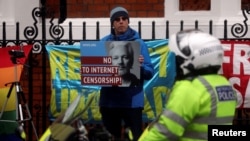Ecuador reserves the right to conduct an investigation of Wikileaks founder Julian Assange for allegedly leaking information about President Lenin Moreno's personal life, the foreign minister said on Monday.
Assange, an Ecuadorian citizen, has lived in the country's London embassy for nearly seven years. Moreno has said Assange has violated the terms of his asylum, but that the country has no imminent plan to expel him from the embassy.
The Ecuadorian government told the United Nations' special rapporteur on the right to privacy last week that Wikileaks could be involved in the posting on social media of communications and photographs of Moreno and his family.
"Ecuador reserves the right to conduct investigations," foreign minister Jose Valencia told reporters. "The state has the ability to assign and revise this diplomatic asylum; therefore, we can conduct some investigations."
"We have reports that he possibly has access (to the internet). This specifically determines the investigations that we will take forward," Valencia said.
The investigation will be independent from the one conducted by the U.N.'s rapporteur, who is set to visit Assange in London on April 25, according to Valencia.
Assange says Ecuador is seeking to end his asylum, which began in 2012, by implicating him and Wikileaks in accusations of corruption leveled against Moreno and his family that have been shared on social media.
Assange's lawyer in Ecuador, Carlos Poveda, has asked Ecuador to clarify if it is planning to terminate Assange's asylum.
"That decision will be made between two options: continue asylum or revise the situation depending on the merits that may or may not exist," Valencia said.
Assange took refuge in the embassy in 2012 to avoid being extradited to Sweden, where authorities wanted to question him as part of a sexual assault investigation.
That probe was later dropped, but Assange fears he could be extradited to face charges in the United States, where federal prosecutors are investigating WikiLeaks.
Ecuador last year established new rules for Assange's behavior while in the embassy, requiring he pay his medical bills and clean up after his pet cat. He challenged the rules in local and international tribunals, arguing they violated his human rights. Both courts ruled against him.
Last month, the Inter-American Commission on Human Rights, which is linked to the Organization of American States, rejected Assange's request that Ecuador ease the conditions it has imposed on his residence in the London embassy.







